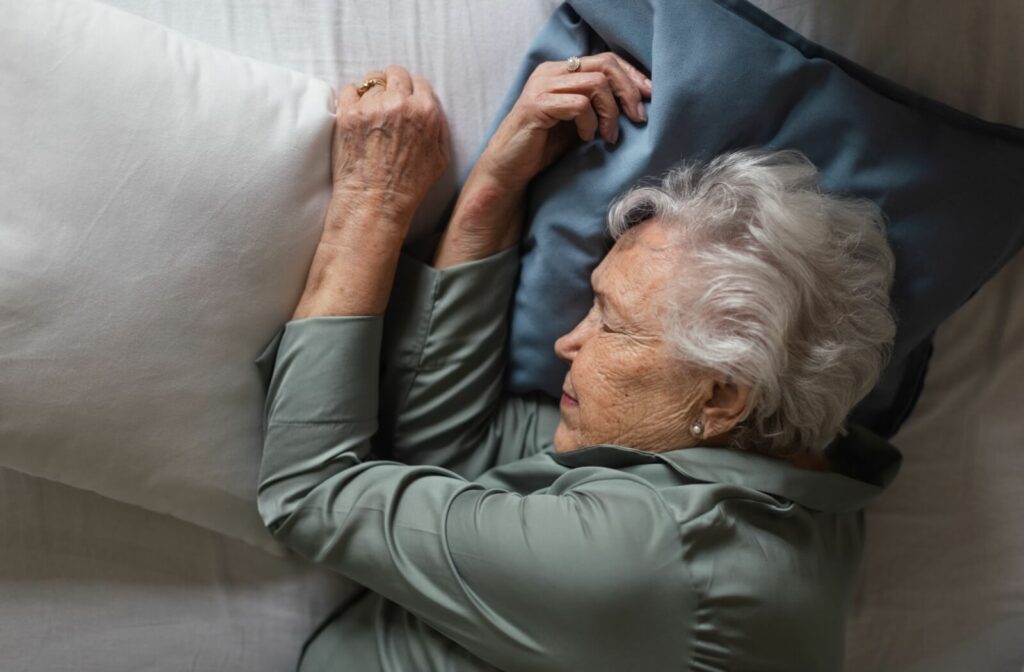As your parent or loved one ages, one of the most important things you can support is their sleep. Sleep plays a vital role in protecting the brain—it gives the mind time to rest, process memories, and repair itself. For older adults, especially those receiving memory care, hospice, or respite support, quality sleep can make a world of difference in their comfort, clarity, and well-being.
If you’ve noticed your loved one struggling to fall or stay asleep, you’re not alone. Changes in sleep patterns are common with age, but that doesn’t mean poor sleep should be accepted as inevitable. With some awareness and support, you can help create better rest for your loved one—and that starts with understanding why sleep matters so much in the first place.
Why Sleep Matters So Much for Seniors
Sleep is the body’s reset button. It’s when healing happens—physically, emotionally, and cognitively. For seniors, especially those with complex medical needs or cognitive conditions, sleep becomes even more essential.
Protecting Brain Health & Memory
Sleep supports brain function by helping the brain organize and store memories. It also allows the brain to flush out waste products that build up during the day. This process is especially important for seniors with memory loss, as poor sleep has been linked to faster cognitive decline.
Supporting Emotional Wellness
Good sleep also helps regulate mood and reduce feelings of anxiety or depression. When your loved one is well-rested, they’re more likely to feel calm, connected, and emotionally resilient.
Promoting Physical Recovery
Sleep gives the body a chance to heal from everyday wear and tear to chronic illnesses. It strengthens the immune system and helps manage conditions like high blood pressure, diabetes, and inflammation, which can be particularly important in hospice or respite care.
How Much Sleep Do Seniors Need?
Most older adults still need between 7—9 hours of sleep each night. However, changes in the brain and body can make it harder to achieve deep, uninterrupted sleep. If your loved one is spending enough time in bed but still seems tired during the day, sleep quality, not quantity, might be the issue.
Common Sleep Challenges in Seniors
If your loved one is experiencing poor sleep, it may stem from a number of causes. Understanding these can help you know when to talk to care providers and what to look out for.
1. Changes in the Body’s Internal Clock
It’s common for seniors to feel sleepy earlier in the evening and wake up earlier in the morning. This shift in circadian rhythm can sometimes disrupt routines, especially when combined with more frequent nighttime awakenings.
2. Medical Conditions and Medications
Many chronic health conditions—such as arthritis, dementia, or respiratory issues—can cause discomfort or restlessness. Medications can also interfere with sleep cycles or cause drowsiness during the day, which throws off nighttime sleep.
3. Napping Habits
Short naps can offer a helpful energy boost, but longer or late-afternoon naps can make it harder to fall asleep at night. Balancing rest with activity is key.
4. Stress, Anxiety, or Confusion
For seniors in memory care or hospice, stress and confusion can increase at the end of the day—a phenomenon known as “sundowning.” This can lead to agitation, disorientation, and difficulty falling asleep.
Ways You Can Help Support Better Sleep
While some sleep disturbances are part of aging, there are still many small, impactful ways you can help your loved one rest more peacefully. These strategies can often be implemented alongside professional care support:
Encourage a Consistent Sleep Routine
Routines help signal to the brain that it’s time to wind down. Encouraging a regular bedtime and wake-up time, even on weekends, can make a difference.
Create a Peaceful Sleep Environment
A quiet, cool, and dimly lit room promotes better rest. Soft bedding, white noise machines, and minimizing nighttime light exposure can help set the stage for sleep.
Support Gentle Activity During the Day
Daily movement, like short walks or light stretching, can promote better nighttime sleep. Memory care communities like Liana at Sarasota also include calming activities during the day to avoid overstimulation at night.
Avoid Caffeine or Large Meals Before Bed
Try to avoid heavy dinners or caffeinated drinks in the evening, which can delay sleep. A light snack like a banana, a few almonds, or warm milk can promote relaxation without discomfort.
Use Soothing Bedtime Rituals
Calming activities like listening to soft music, reading aloud, or practicing guided breathing can help ease the mind before bed. These rituals are especially helpful for seniors with memory loss who benefit from gentle, familiar cues.
Talk to Their Care Team
If poor sleep is ongoing, talk to the care team. They can check for underlying medical issues, adjust medications, or explore safe sleep aids if needed. In memory care or hospice settings, sleep is part of the care plan, and families should always feel empowered to ask questions or express concerns.
How Liana of Sarasota Can Help
In a supportive setting like Liana of Sarasota, we take a whole-person approach to sleep. That means addressing the environment, routines, and physical or emotional needs that affect rest.
Whether your loved one is staying short-term for respite care or receiving ongoing memory or hospice care, our team is here to create a calming, consistent environment that promotes relaxation and dignity. Contact us today to learn more about our care options and how we can support both you and your loved one.



